
AFFORDABLE AND CLEAN ENERGY
Sustainable development goal 7 aims to ensure affordable, reliable, sustainable, and clean energy for all. About 20% of the world’s population has no access to modern electricity. Even though 18% of the world’s population lives in India, our share in the world’s primary energy consumption is just 6%. Energy disparity is more in rural areas and that hinders progress. About 3 billion people use wood and charcoal for cooking that causes pollution, affects their health, and contributes to the generation of greenhouse gases and climatic change. Newer technologies and government policies are working towards reducing the cost of renewable energy. Ensuring access to clean, affordable, reliable, and sustainable energy will help in improving health, reducing poverty, mitigating the effect of climate change, and benefitting overall to the environment.
NITTE DU’S MISSION TOWARDS AFFORDABLE AND CLEAN ENERGY:
The university is committed to conserve power with by practicing maximum utilization: minimum wastage on campus. All the decisions are aimed for efficient usage of energy and generating and using clean energy. Green Buildings: The Building Science Lab at the Nitte Institute of Architecture, aims at quantifying the building’s energy performance.
GREEN ENERGY


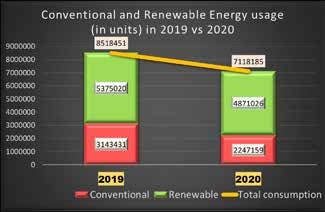
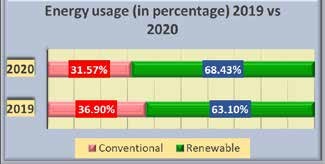
Nitte DU has facilities for following alternate sources of energy and energy conservation measures of utilizing solar energy, wind energy in addition to hydroelectric power. The University sources electric power from the local electricity board (MESCOM), a private power vendor, and in-campus solar power units. Nearly 60% of total requirement comes from a supplier who generates power from renewable energy sources. With a view to contribute towards green initiative, the University has entered into an open access agreement for Hydro & Wind energy with M/s. AMR Power Pvt Ltd, M/s. Doddanavar Global Energy Pvt Ltd and M/s. Brindavan Hydropower Pvt Ltd. 68 % of electrical power is from renewable sources. The Nitte Deemed to be University has on campus Solar power generators. Power for the Street lamps in all campuses is sourced from solar panels. Solar Panels of about 500 KW capacity have been installed across the rooftops of most of the buildings in the university campus to maximize the use of on-site renewable energy generation wherever practical. Furthermore, clean energy is wheeled from various hydro, solar, and wind sources for usage. In the year 2020, the total energy usage has decreased by approximately 16.44%. The share of green energy used has increased from 63.10% in 2019 to 68.43% in 2020.
The Biogas unit is used for recycling of organic waste. The biogas plant generates cooking gas for the common kitchen.
Energy savings measures:
Conventional light fittings are being replaced with energy-saving lights in a phased manner. VFD’s which help in reducing running costs and improving the life of motors have been installed in all critical areas. Solar panels have been installed on rooftops of buildings on the campus to generate electricity and also to contribute towards the green initiative. Additionally, solar water heaters have been installed in all hostels. A synchronization panel/ Load manager has been provided for DG sets at all campuses so as to ensure optimum utilization of power generation. Periodical Maintenance / AMC of all electrical equipment including panels is carried out as per schedule. Additionally, all critical equipment has been provided with closely monitored AMC’s which helps in enhancing the life of the equipment and also reduces mean time between failures. Timers have been installed at various locations for switching on/ off security lights which helps in minimizing energy consumption.
Energy Audit:
Energy conservation is not confined to any one individual or department. In fact, it is the concern and responsibility of every member of the university irrespective of his/her position. The university conducts regular energy audits to assess the usage, and growth in demand due to rapid expansion. The audit conducted in the year 2019 aims to provide an information base for overall energy conservation programme covering essentially energy utilization analysis and evaluation of energy conservation measures along with a proactive effort to minimise environmental effects.
Green transportation: The university has an electric car to carry faculty and other staff between various office buildings within the university campus. There is also a battery- operated buggy to carry students from hostels to their classrooms in the college and to the hospital. 20 cycles are made available for the use of faculty and students to commute within the university campus.


Staff, students and other employees are strongly encouraged to avail the common transport facilities provided by the University. There are 19 buses which cater to the common mode of transportation. An additional of 6 vans of 14-seater capacity regularly commute between campuses and city to transport staff, students and other employees of the University.
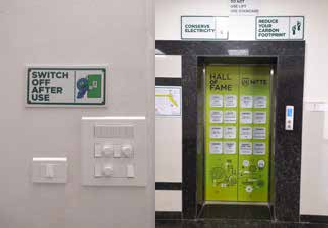

ENERGY CONSERVATION AWARENESS PROGRAMS:
Nitte DU is committed to conserve energy. It believes in energy saved is energy generated. Every institute is equipped with educational instructions in all classroom/seminar rooms and halls. Electrical appliances have reminders to switch off after use displayed prominently near the switch board. The elevators are accompanied with instructions encouraging the commuters to use the steps. The displays remind the commuters in reduction of their carbon footprint.NATIONAL ENERGY CONSERVATION DAY 2020:
National Energy Conservation Day was jointly organized by Nitte University Green Initiative Project (NUGIP), National Service Scheme (NSS) and DST Nitte University-Technology Enabling Centre (DST NU-TEC) at Nitte (Deemed to be University) campus, New Auditorium, ABSMIDS building on 14th December 2020. Dr A Venkata Ramana, Chairman, New Mangalore Port Trust, Panambur, was the chief guest. He elucidated the significance of the day and the urgent need for energy conservation in a rapidly developing country like ours. Sri Santhosh Kumar Rai Boliyar was the guest of honour; his insightful observations on energy and power were relevant. The Vice Chancellor of Nitte (Deemed to be University) Prof. Dr Satheesh Kumar Bhandary presided the function. In his presidential remarks he particularized the pressing needs of discovering alternative sources of energy. The participants in the programme took a pledge that they will make judicious use of energy on and off campus.https://www.youtube.comwatch?v=BOtREUoVP70 https://www.thehindu.com/news/cities/ Mangalore/book-with-spectacular-photos-of- birds-released-at-deralakatte/article33334392. ece

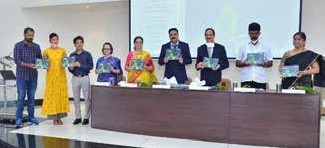
AWARD AND RECOGNITION
ABSMIDS is recognized Swachhta Action Plan Institution, for post COVID-19 Sanitation & Hygiene, Waste management, Water management, Energy management, Greenery.
EDUCATION AND RESEARCH
Nitte Institute of Architecture provides a Bachelor of Architecture program. Approximately 50-60 students are enrolled in these courses per year. The program incorporates courses related to energy-efficient and sustainable architecture, intelligent buildings, LEED lab which includes LEED certification, energy conservation building code, solar energy for lighting, green buildings, renewable energy, energy-efficient design for buildings as elective subjects for students. These programs support creative exploration and nurture the journey of students towards sustainable architectural practice. The university has Architecture Design Studio 2, Environmental Design Studio and active research is being conducted on constructing green buildings that are suitable for the climate.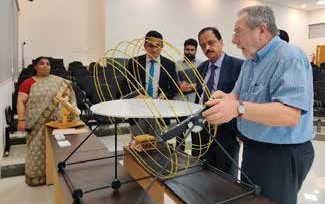
SYMPOSIUM
AYAN 2020, a Passive Solar Design and Shading Symposium was held at Nitte Institute of Architecture on 18th February 2020. The symposium was helmed by Norbert Lechner, Prof. Emeritus, Auburn University, USA. Prof Norbert in his keynote address, ‘Architecture in a Warming World’ talked about the problems created by climate change and how the architecture fraternity had a big role to play in combating it.The lecture was followed by a workshop where Prof. Lecher presented heliodons designed by him to students and faculty, explaining its role in helping design passive solar, climate responsive buildings.
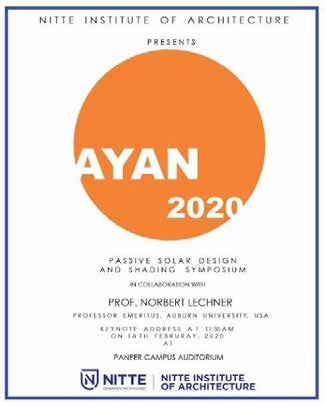


.png)